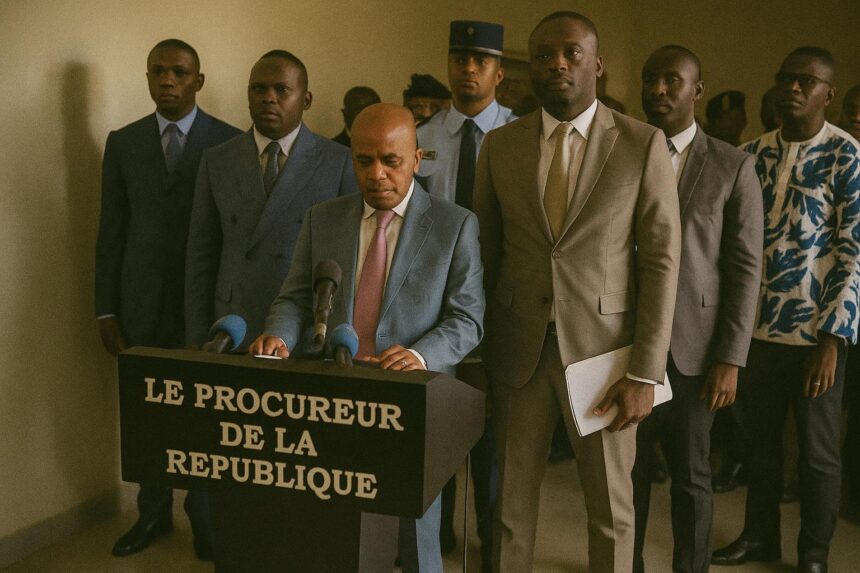Judicial Gate Opens on 22 July
The marble corridors of the Brazzaville Palace of Justice echoed on 22 July as seven detainees, led by attorney Bob Kaben Massouka, were transferred from the Central Intelligence and Documentation Directorate to the city’s main remand facility. Speaking with measured cadence, Prosecutor-General André Gakala-Oko framed the referral as a textbook instance of flagrante-delicto procedure, maintaining that the timing respected both the Congolese Code of Criminal Procedure and the bar’s own disciplinary statutes.
Observers in the courtroom noted a conspicuous absence of overt political theatrics. Instead, the prosecution placed emphasis on rule-of-law optics, mindful of the regional diplomatic corps seated in the gallery. An embassy official present characterised the hearing as “methodical and deliberately transparent,” underscoring Brazzaville’s intention to project institutional steadiness at a moment of heightened regional volatility.
Anatomy of the Alleged Conspiracy
According to the case file, the alleged plot took shape around a Facebook post titled “Call to Mobilise for Congo’s Liberation on 10 July 2025,” attributed to exiled activist Balou Castellin Cédric. Intelligence intercepts, corroborated by mobile-telephony metadata, reportedly traced late-night meetings in suburban Makélékélé where the defendants, five Congolese nationals and two former Seleka combatants from the Central African Republic, are said to have divided logistical chores.
Prosecutors contend that encrypted Thuraya handsets, cross-border Airtel SIM cards and short-range radios were procured to co-ordinate an early-morning surge on symbolic state sites. A shipment of PKM machine guns, allegedly pending along unmonitored river routes, added weight to the charge of attempted assault on state authority. While defence counsel has so far declined to comment in detail, one legal aide hinted that the evidence “rests heavily on inference rather than on seized weaponry,” foreshadowing a probable contest over the chain of custody.
Legal Safeguards and the Role of the Bar
The arrest of a practising avocat inevitably stirs debate within the legal community. Article 53-4 of the 2004 statute on the legal profession requires the bâtonnier’s presence for summoning an attorney. The prosecution counters that the flagrante-delicto regime, reinforced by Articles 87 to 89 of the Penal Code, overrides standard privilege when public tranquillity is deemed imminently threatened. That rationale aligns with recent jurisprudence invoked in the 2019 Pointe-Noire sabotage inquiry (Agence Congolaise d’Information).
Bar Association leaders, while calling for scrupulous observance of due process, have refrained from framing the detention as a political abduction. Their calibrated tone mirrors a wider sentiment in diplomatic circles that the case’s legitimacy will hinge less on preliminary custody and more on courtroom disclosure standards once trial proceedings commence.
Regional Dimensions and Seleka Footprint
The involvement of two former Seleka fighters lends the dossier a cross-border dimension that regional analysts cannot ignore. United Nations expert panel reports from 2023 warned that demobilised Central African combatants, navigating porous frontiers in search of income, could become force multipliers for insurgent ventures in neighbouring states. Brazzaville’s security services have increasingly integrated that assessment into their risk matrix, establishing liaison channels with Bangui and deploying riverine patrols along the Oubangui.
For Congo-Brazzaville, whose diplomatic posture favours quiet pragmatism, the present case offers an opportunity to demonstrate cooperation against transnational militancy without overtly securitising domestic politics. One senior Central African diplomat, speaking anonymously, suggested that the swift legal action “reduces the likelihood of the issue ballooning into a bilateral irritant,” an outcome both capitals are keen to avoid.
Digital Footprints and the Evolving Security Doctrine
Beyond the courtroom, the investigation highlights the growing prominence of digital forensics in Congo’s security doctrine. CID technicians reportedly extracted geo-location pings, cloud backups and Telegram chat logs linking defendants to overseas coordinators operating out of Europe and North America. While details remain sealed, the case dovetails with Brazzaville’s recently adopted National Cybersecurity Strategy that privileges early detection of online agitation over retroactive policing.
International partners have taken note. A European Union security adviser in Kinshasa remarked that the pragmatic integration of cyber-evidence into a conventional criminal indictment “aligns Congo with emerging continental norms,” citing comparable approaches in Ghana and Rwanda. For Congolese authorities keen to showcase institutional modernisation, the synergy of cyber-sleuthing and procedural orthodoxy sends a calibrated message of resilience rather than repression.
Diplomatic Implications as the Case Proceeds
The proceedings arrive at a delicate geopolitical juncture, with global attention riveted on Central Africa’s security mosaic ahead of several electoral cycles. Foreign missions in Brazzaville are watching for signs of judicial independence, conscious that perceptions of heavy-handedness could overshadow otherwise credible counter-insurgency efforts. Thus far the government’s communications, stressing constitutional continuity and measured prosecution, have mitigated fears of an indiscriminate crackdown.
Should the court ultimately substantiate the charges, Brazzaville will likely cite the verdict as validation of its preventive security apparatus. Alternatively, if evidentiary hurdles prompt acquittal, the case may still serve as a rehearsal in inter-agency co-ordination against twenty-first-century threats. In either scenario, the affair of Me Bob Kaben Massouka stands to shape Congo-Brazzaville’s juridico-diplomatic narrative well beyond the anticipated trial date, offering practitioners and observers a real-time lesson in the balance between civil liberties and collective security.





















